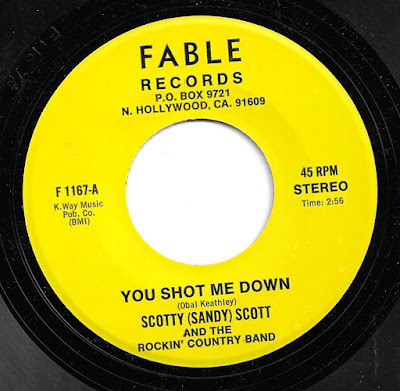Greetings!
First, I would like to make sure everyone gets to see and download an album which was linked in the comments of a previous post. It is a full Hollywood Artists album, and it is available here. Thank you, anonymous poster!
And now, for today's main feature:
For those who haven't read any of the 18 or so places I've written it before, I really get a kick out of the early Cinema releases, all billed as being by "The Real Pros", but largely featuring one guy with one of those early '70's console all-in-one keyboards.
While today's two offerings will never make my "all time favorite Cinema releases" file, I think they do, in a way, offer up the quintessential song-poem experience, or at least we have the scam (or, if you prefer, the design of the business plan) boiled down to its most basic essence: A person writes a lyric and sends it in. It gets set to a superbly generic, sort of loungey arrangement and is sung by a soloist who accompanies himself on an all in one cheesy organ. The performance is one that any decent composer and musician could throw together in a quarter hour.
No big arrangement, no band, nothing particularly professional sounding about it at all. The lyric gets written - "Mixed Up Life", in this case, happily with the sort of utterly cookie cutter lyrics found so often in the genre - and a short while later, it is a demo-level-sounding generic song. And you have a perfect record with which to explain and demonstrate the song-poem to the uninitiated.
Oh, and the last vocal note is worth the price of admission.
Play:
I chose to write all that about "Mixed Up Life", but I could pretty much say the same things about the flip side, "Nobody's Baby Am I", which has the added feature of a mess up in the bass notes during the first seven seconds. Would have been that hard to start over, after just getting seven seconds into your performance? Undoubtedly no, but clearly that option was considered unnecessary.
Also note the producer note at the bottom of each side of the label, which in each case falsely co-credits the song-poet herself for production work. This is one of the earliest Cinema releases (1971 - as evident by the "71" in the label number), and this bit of fiction is a feature that Cinema would eliminate by its 1972 releases.
Play:
And now, let's return to our Cut-Up / Mash-Up feature, after a one week break.
I'm sticking with the Mash-Up theme of the last few posts, and returning to circa 2005, when I was doing a bunch of these sorts of things. I focused on one of my favorite Beatles' tracks, "Julia". As you may know, this is the only song to ever come out under the Beatles name to feature a solo John Lennon performance. It's also one of the fairly few Beatles songs not to feature any percussion.
I thought maybe I'd like to hear how it sounded with some rhythm behind it. And I'd like to break down what I did. In order to understand where, exactly, I took some of those rhythms from, you have to hear two of my beloved Star Ads. In case you aren't familiar with Star Ads, I wrote about them
here and
here, and quite recently, I was
featured on a podcast talking all about them and sharing a bunch of them.
Anyway, I thought of two of them which featured significant and interesting percussion in spots, and in which that percussion was heard, by itself, at times.
First, I thought about this bizarre little ad, specifically the two bars of percussion at about the 0:03 point, which I would loop and slow down for the first verse of "Julia", then return to it more and more as the song continues:
Play:
Then I thought of this high powered car ad, specifically, the drums heard between the sales pitches and at the end, which I would slow down to an extreme degree, and use on the bridge and, again, more and more, near and at the end of "Julia".
Play:
Finally, I swiped the opening drum intro from "Why Don't We Do It In the Road", which I'm guessing nearly all of you are familiar with, and which occurs a few moments before "Julia" on The White Album. I used that bit of drumming extensively, too.
I called the resulting creation, "Rhythm of the Ocean Child", and it sounds like this:
Play:








